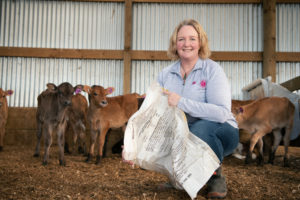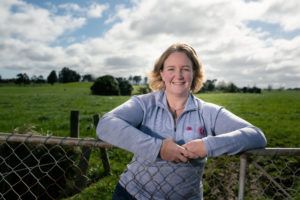Dairy Woman of the Year, primary school teacher and passionate environmentalist Trish Rankin from Taranaki wants all farmers to get educated on the six Rs of waste decision-making: Refuse, Reduce, Reuse/Repair, Recycle, Rehome and Rot (compost).
Rankin took part in the Kellogg Leadership Programme last year. With her research project focussing on minimising waste on farms, she looked at how a circular economy model could be developed for a New Zealand dairy farm. Essentially, this involves regenerating natural systems, designing out waste and pollution, and reusing products and materials.
Rankin’s reflection on how she could be doing better with her farm waste was the main driver for the project.
Trish and her husband Glen are in their second season as herd-owning sharemilkers on a 154 hectare Parininihi ki Waitotara farm in South Taranaki milking 440 cows. With no recycling or rubbish collection for the property, 12m3 of waste went from skip bin to landfill each year.
Through researching her project Rankin discovered that “we have the ability to return and recycle many items used on farm, like containers, silage wrap and plastics”. However, less than half of the 100 farmers she surveyed used it as a way of dealing with waste. ”Almost 40 percent of the farmers still burn or bury and this might affect our social license to farm”.
She recorded the waste her farm produced over 40 days during February and March 2019 – a ‘quiet’ time on the farming calendar, with the main activity being milking. The waste audit highlighted that “a lot of what we buy is in single use” – very ‘linear’ where we take it, use it and throw it away.
The circular model of non-biological waste is “about more than recycling”. It’s about minimising the amount of waste we create. Farmers want to do better – off the back of both public sentiment and to be good kaitiakitanga (guardians of the land).
“On our farm, we buy products with the Agrecovery logo. This is an assurance that the containers can be recycled.
“If we buy better, sell better, and make better decisions, we can minimise waste and reduce emissions at the same time”. Often it’s just about making small changes, like finding out what can be recycled and where.
Rankin now uses scrap metal dealers, recycles silage wrap and returns triple-rinsed containers to her local Agrecovery depot.


